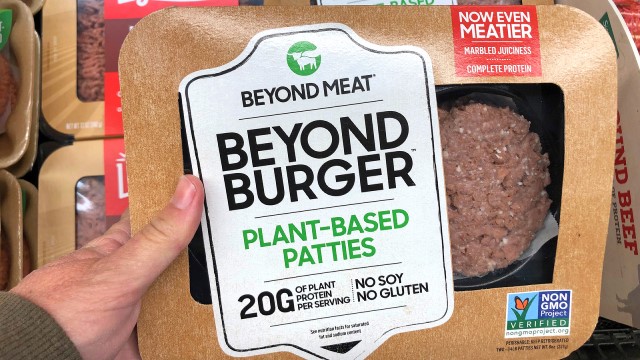
In November last year, London based food writer George Reynolds wrote an article in The Guardian titled “Why do people hate vegans?”. It followed other similar media articles and stories, including a debate on Good Morning Britain a year earlier asking “Do people hate vegans?” and Medical News Today in the US posing the question of why vegan eating can spark rage.
The nature of the articles and theories put forward indicate food choice has become a subject of radical personal opinion.
While the answers to these questions may be intriguing they are less relevant than the fact they signal, in an era of rising rebellion and growing personal power, the need to give significant thought to how plant-based foods are labelled.
It’s this controversy that is behind a shift away from “vegan” claims on labels, to greater use of the term “plant-based”.
We saw this in October last year when Hungry Jack’s launched their Rebel Whopper Burger, featuring a vegan patty made from soy protein, vegetable oil, flavours, colours and various additives. The product places Hungry Jack’s alongside other fast-food outlets in offering up more vegan choices. However, while the product is vegan, the marketing doesn’t mention it. Rather, the messaging states that the burger features a patty made from plants, and that it is flame grilled to give the same taste as the standard Whopper®.
Use of the term “plant-based” over “vegan” makes sense when we consider the broader appeal it holds for a market looking to reduce their intake of meat for both personal and planetary health reasons. According to a report by Food Frontier and Deloitte Access Economics, around 32 per cent of Australians have consciously tried to limit their intake of meat. This contrasts with the much smaller 2 per cent of Australians who identify themselves as vegans and the 13 per cent who classify themselves as vegetarian.
In terms of sales to date, the same Deloitte report found that in 2018–19, Australians spent $150 million on plant-based meat products. With investment also estimated at $3.6 billion globally, the plant-based food market is clearly an attractive one for food manufacturers.
This growth in interest in eating more plant-based foods is starting to impact sales of meat in Australia, with Nielsen data showing both young and older Australians bought less meat in 2018 than they did in 2017.
Considerations around labelling of plant-based foods doesn’t stop with the debate over the use of “vegan” or “plant-based”. Some organisations and political groups, such as the National Farmers’ Federation and the National Party, have called for a ban on the use of the terms “milk” and “meat” on plant-based products. At the time of writing, this issue was being taken up in a motion by the WA Nationals calling for the federal government to undertake labelling reform around use of the terms “meat”, “milk” and “seafood”.
At present, the Food Standards Code includes definitions for these three terms, indicating careful thought in the labelling of milk and meat alternatives is required to avoid being misleading and deceptive.
Another product yet to hit Australian supermarket shelves but which is currently undergoing significant investment is that of cell-based meat alternatives. Unlike plant-based alternatives, cell-based meats are made from animal cells, grown in a bioreactor and given a mix of nutrients and protein to grow and divide. This system results in a product that is animal based but without the actual animal. To date, no applications have been made to Food Standards Australia New Zealand (FSANZ) around the regulatory considerations for these future products. However, with current high-level investment they will likely provide another option for consumers looking for alternative sources of protein in the future.
For food manufacturers entering this space, long-term success and the ability to build and maintain consumer relevance will rely on authentically addressing both personal and planetary health issues, as well as maintaining accurate labelling and marketing messages.
It is noteworthy that currently the market is experiencing an emerging backlash against the degree of processing that some plant-based alternatives undergo. The desire for more whole and real foods is counter to the ingredient list consumers see when purchasing some plant-based meat alternatives and this is one area for future consideration. Some companies, such as Israeli start-up Rilbite, are addressing this by making plant-based meat alternatives from wholefoods, including ingredients such as lentils, vegetables and grains. They promote their product as containing just six ingredients and containing no e-numbers, processed oils or methylcellulose. Such products are likely represent the next generation of plant-based meat alternatives, appealing to both the desire for more meatless meals, as well as the desire for more whole and real foods.
Another consideration for companies looking to enter or extend their presence in this space is the need to closely assess the origins and nature of the plant-based ingredients that go into the products. Speaking at Global Table in Melbourne last year, futurist Mike Lee from Alpha Foods and The Future Market in the US, highlighted environmental issues with the use of monocultures, an area that plant-based foods made from soy protein in particular don’t necessarily address. His US-based project to increase biodiversity on supermarket shelves highlights an opportunity to assess possibilities for incorporating a greater diversity of plant-based foods into the ingredients of plant-based meat alternatives in the future. Maintaining a broad perspective on environmental and planetary issues is an important consideration in the product development and marketing of new plant-based foods.
Tackled responsibility and authentically, and with a sensitivity to evolving consumer values, plant-based meat and milk alternatives are likely to continue their appeal to the growing, more conscious consumer of the future.
Sharon Natoli is a speaker and advisor on food and health trends and author of Food for a Better Future. This article first appeared in the January issue of Inside FMCG. April issue coming soon, subscribe here.













